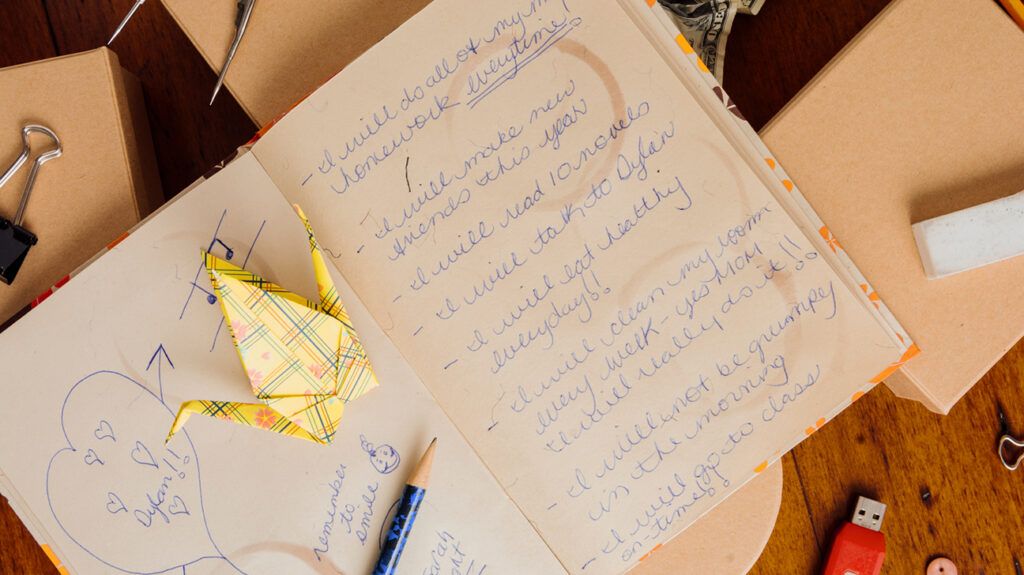Journaling can be an effective coping technique that may reduce anxiety and stress by helping you work through your anxious feelings.

What’s your go-to coping strategy when anxiety sets in? Maybe you find solace in meditation or like to talk with a friend.
When it comes to managing anxiety, there’s no one-size-fits-all approach.
One of the most effective stress management tools can quite literally at the tip of your fingers. Journal writing can help you organize your thoughts and process them in a healthy manner.
Can journaling help with anxiety? The answer is yes.
A
Have you ever noticed how your thoughts influence how you feel? Your mind and body are in constant communication, so journaling benefits your overall emotional health because it helps regulate your emotions.
In addition to emotional regulation, journaling can help you prioritize your concerns, so you can recognize your triggers and identify negative thought patterns.
Journaling provides an outlet for negative thoughts. It can also help clear and calm your mind. Read about the different types of journaling below to see which one might suit you best.
Freewriting
Freewriting simply involves jotting down your thoughts. You don’t have to write anything profound, just write what comes from your heart, without any judgment.
To begin, you can choose a time limit for yourself and try to write until the timer is up. Write whatever comes to your mind, without any worry about grammar or spelling. Remember, this is just for you.
When the timer is up, reread what you wrote. The purpose is to explore your thoughts and gain a better understanding of how you’re feeling.
Expressive writing
One of the most effective ways to work through an emotional challenge can be expressive writing. This is where you write continuously for 20 minutes about your deepest thoughts and emotions surrounding your life. The goal is to gain insight into your feelings.
Sitting with your feelings may not always be the most pleasant experience, and it may make you feel sad afterward. However, researchers found that expressive writers had a greater sense of meaning later on. They also found people living with depression had a reduction in their symptoms after trying the practice.
Experts find that expressive writing works because when you sit down and try to make sense of something, your thoughts settle down and you’re able to observe your feelings and experiences with new insights and perspectives.
Thought diary
A popular cognitive behavioral therapy (CBT) exercise is keeping a thought diary. This technique involves you writing down your thoughts and feelings, along with when and where you experienced these feelings.
The goal of keeping a thought diary is to increase your
Here are some basic guidelines that can help you get started:
- Create a journal page with five columns labeled: case, feeling, thinking, illusions, and reality.
- Under the “case” column, note the situation you are currently in (e.g., broke up with partner).
- Under the “feeling” column, write down how you’re feeling about the situation.
- Under the “thinking” column, write down what you’re thinking (e.g., my partner won’t talk with me).
- Under the “illusion” column, identify any illogical ideas you have about the situation.
- Under the “reality” column, list the most likely outcome of your situation.
Keeping a regular thought diary can help you manage anxiety. When you’re aware of your thinking patterns, you may be better able to weigh the evidence and replace unhelpful thoughts with more helpful alternatives.
Do you ever feel like you want to write down how you’re feeling, but you just don’t know where to begin? Starting a journal can be intimidating, but using a prompt can give you a solid place to start.
Consider these journal prompts to help you work through anxiety:
- Brainstorm a list of self-care ideas and activities.
- Ask yourself, “What’s something I need to let go of?”
- Ask yourself, “What activities make me feel calm?”
- Think of the last time you let negative thoughts spiral out of control. What were these thoughts?
- Make a list of 10 affirmations. Read them each time you feel anxious.
- What does your anxiety sound like, look like, and feel like?
Remember, you don’t have to follow or stick to any specific format. The purpose of your journal is to help you get your thoughts on the page and help you get in touch with your emotions.
Journaling is a tool that can ease anxiety because it can help you make sense of your experiences and thoughts. It’s a simple practice that you can do for yourself anytime and anywhere.
There are many ways to journal that you might want to consider, including:
- freewriting
- expressive writing
- writing a thought diary
Ultimately, choosing the method that works best for you can be most beneficial. The goal is to get your thoughts down on paper, so you can challenge those thoughts or find ways to address them.
When your writing brings up feelings of discomfort that you feel you can’t manage on your own, consider speaking with a therapist who can offer you guidance and support in exploring these emotions.
Talking with a licensed therapist or doctor can help you gain a better understanding and perspective, as well as help you make positive behavior changes, if necessary.
